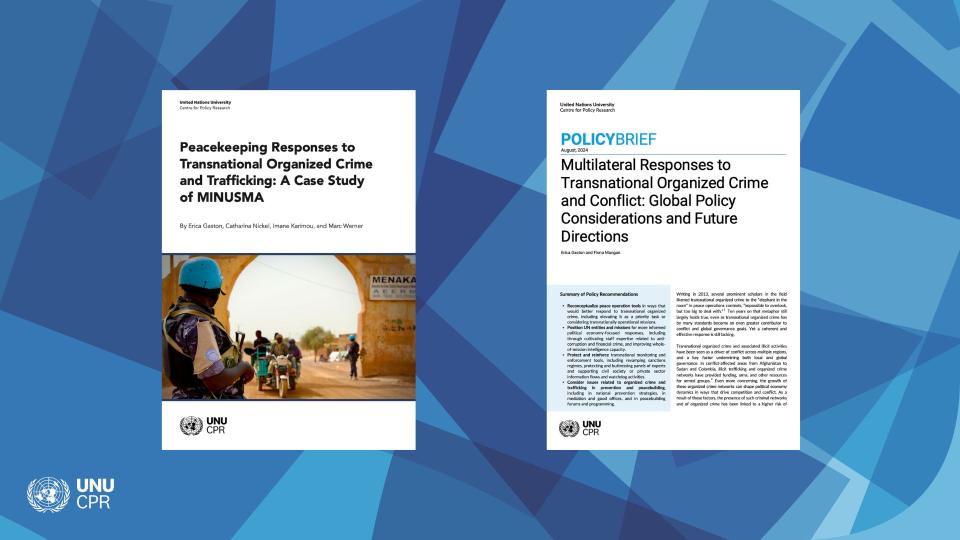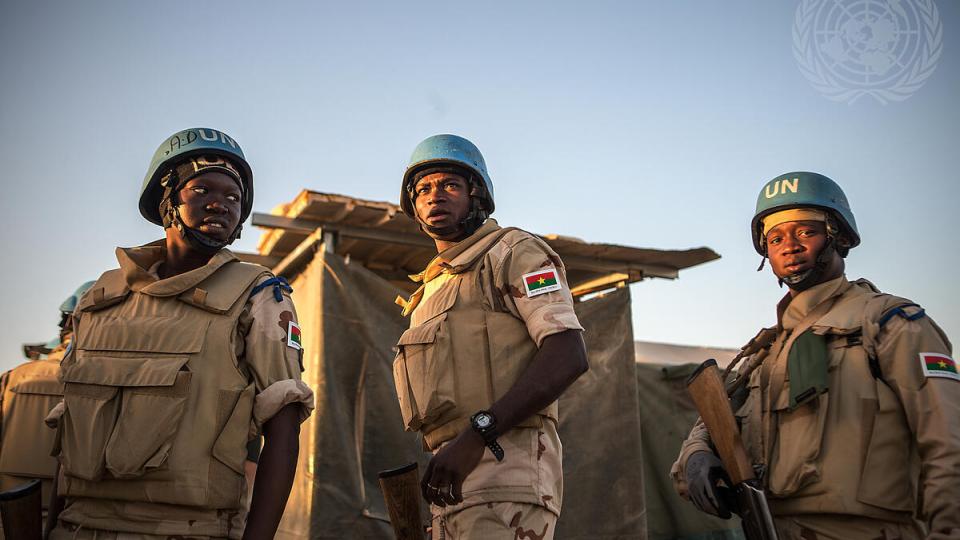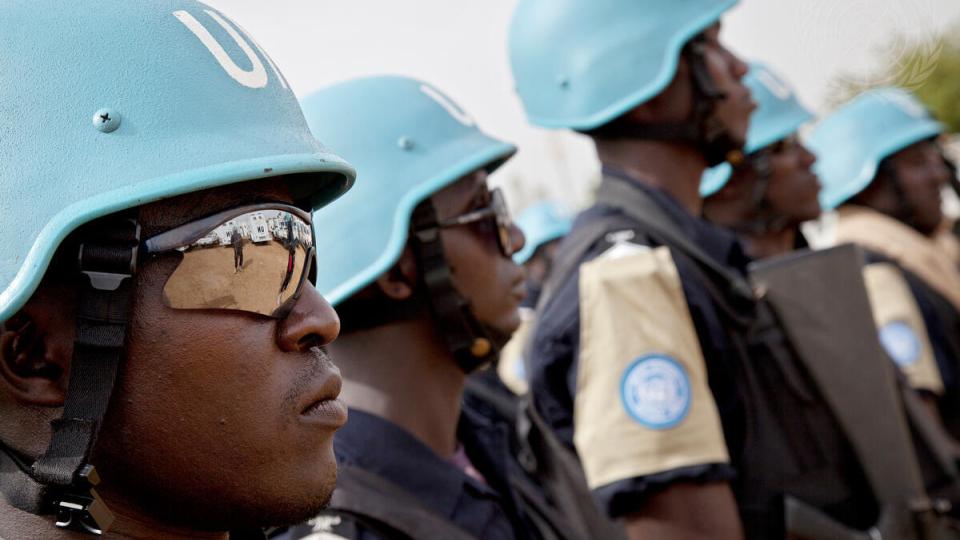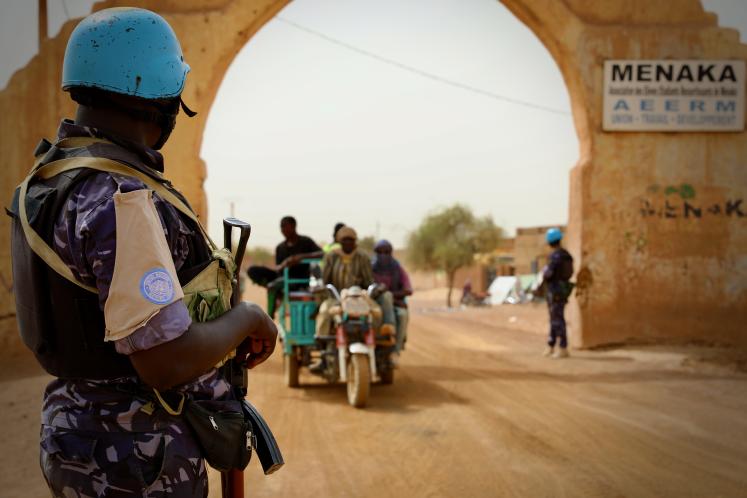Transnational organized crime has been steadily rising since the 1990s. Long overlooked and potentially underestimated in terms of its adverse effects on peace, security and development, this growing challenge can be a major driver of conflict and instability. In conflict-affected States, organized criminal networks can function as a “spoiler”, undermining peace processes and State capacities, and driving instability and violence. Their entanglement with militarized human trafficking rings, armed groups and other conflict actors destabilizes entire regions.
One study found that over half of the Security Council resolutions in 2022 and 2023 referenced organized crime effects in some way. More recently, organized crime and associated gang violence has been a major driver behind instability and State fragility in Haiti; it also remains the number one source of violence and escalating death rates in countries like Ecuador and Mexico.
The first International Day for the Prevention of and Fight Against All Forms of Transnational Organized Crime is a timely moment to reflect on this increasing threat.

These studies reflect growing momentum for more coordinated multilateral action to address transnational criminal networks. Action 24 of the recently adopted Pact for the Future, for instance, commits UN Member States to preventing and combating transnational organized crime, and the Secretary-General’s 2023 New Agenda for Peace highlighted the increasingly transnational nature of criminal activities as a threat that went beyond any one State’s ability to control. In the spirit of developing new multilateral responses, UN treaty bodies and regional organizations have also developed new initiatives to counter organized crime, including a call to action on transnational organized crime by INTERPOL’s general assembly, four new resolutions adopted by the parties to the UN Convention against Transnational Organized Crime in Vienna and a new EU Roadmap to Fight Drug Trafficking and Organised Crime.
Strengthening the capacity of peace operations
There have also been increasing discussions about new models and modalities for peace operations so they can more effectively navigate and respond to transnational criminal threats. The challenges that transnational criminal networks pose have loomed large in many arenas where peace operations are deployed. Peacekeeping operations and special political missions, which often become the focal point of multilateral responses to transnational organized crime, frequently lack the capacity and strategic positioning required. In many missions, despite the severity of the threat, addressing transnational organized crime is not even within the operation’s mandate.
Peacekeeping operations and special political missions, which often become the focal point of multilateral responses to transnational organized crime, frequently lack the capacity and strategic positioning required.
Where it is featured – as was the case with the UN Multidimensional Stabilization Mission in Mali (MINUSMA) – it is considered one mandated task among others. In MINUSMA, for example, although transnational organized crime featured in the Security Council authorizing resolutions from the onset (in 2013), and was even elevated to a priority task in 2018, it was always seen within the mission as only one of many numerous pressing issues within an already broad mandate. It received limited resources and not anywhere near the political support needed to take this very sensitive issue forward.
In addition, both in the framing of mission mandates and in a mission’s approach, organized crime tends to be dealt with through the lens of counter-terrorism. This was strongly in evidence in Mali, but is also a deficit observed in many other contexts. MINUSMA officials interviewed by UNU-CPR said that although there was some tracking of organized crime, in most cases the issue only arose as it related to counter-terrorist financing. While organized crime can certainly contribute to security threats, this narrow view only partially corresponds with the reality of what these networks do within the broader conflict context.

In such contexts, organized crime often forms the basis of the political-economy of conflict. Transnational criminal networks are often closely intertwined with armed groups, but also with Government officials and local actors who may be crucial partners that peacekeeping missions rely on to fulfil their mandates. Ignoring these connections, and attempting to isolate and address only the parts of these networks that can be linked to terrorism or other violent armed actors through a securitized approach, will therefore have very limited impact on the root causes of organized crime and on its broader impact on peacekeeping efforts.
All of these issues present significant challenges. However, recent proposals for reforming peace operations, and new emerging models, may offer pathways for better addressing transnational organized crime. Below we highlight three: 1) creating smaller and more specialized missions with a tighter focus on addressing transnational criminal networks; 2) aligning peace operations with local counter-crime initiatives; and 3) adopting a political-economy approach that utilizes multilateral instruments and mechanisms (including sanctions regimes).
Creating smaller, more specialized missions
There have been some discussions regarding the creation of smaller, specialized missions, more tightly focused on countering transnational criminal networks. For this to work, however, transnational crime would have to be a core priority, rather than an additional element. One policing specialist UNU-CPR interviewed said that if a mission wanted to tackle something as serious as organized crime, then to operationalize it a law enforcement mandate “has to be clearly written in the mandate, and it has to be one of two or three main tasks not one of 40 to 60”.
These specialized missions would need more than a focused mandate, though. They would also need additional capacities.

One option is to partner with more specialized UN entities such as the United Nations Office on Drugs and Crime or UN country teams with rule of law expertise. It could mean building the mission more around police capacities, supported by United Nations Police (UNPOL) or by specialized police teams. However, here too, caution is needed. MINUSMA, for example, had both a healthy deployment of UNPOL and several iterations of special police teams (as well as a “specialized judicial unit on terrorism and transnational organized crime”). UNU-CPR research showed that it not only helps to have these capacities, but to make sure they are equipped with staff that have the expertise, equipment and support tailored to transnational organized crime. This can range from expertise in financial forensics to tracking illegal networks, intelligence gathering, special assets related to border surveillance and having an appropriate degree of context awareness and language skills.
Supporting these capacities would require larger system reforms to create a pipeline of staff with sufficient expertise specific to transnational organized crime. This would require larger institutional reforms and funding discussions within UNPOL as well as the UN’s Office of Rule of Law and Security Institutions and other relevant UN entities.
Working alongside local counter-crime efforts
Whether in these new more specialized models, or in other UN peace operations or country team contexts, it is important to focus more on how to work with local efforts to counter organized crime. UNU-CPR’s global survey of counter-crime policies found an increased trend toward civil society monitoring and reporting, for example with global watchdog groups such as Bellingcat or other country-specific monitoring groups. In many UN country contexts, civil society groups have proven to be important partners for understanding local developments and identifying future issues. Community engagement teams or processes already exist in many missions, but these are often focused on other peacekeeping or peacebuilding tasks and can often be overlooked when thinking about developing local responses to trafficking or organized crime.
In many UN country contexts, civil society groups have proven to be important partners for understanding local developments and identifying future issues.
In our examination of countering organized crime in MINUSMA, UNU-CPR sought out views in a community where gold smuggling, human trafficking and other criminal networks are prevalent. Many communities and local officials were taking significant efforts to counter these networks, interdict illegal shipments and establish community protection networks. But they expressed a sense of disconnection with international efforts and identified few ways that multilateral responses were trickling down to help them at a local level.
Cooperation with national authorities can also be crucial, although the sensitivity of organized crime and larger mission-government tensions can be an issue; they certainly were in Mali. Nonetheless, in many missions it would be worth exploring closer cooperation with existing national entities, such as Financial Intelligence Units (FIUs). FIUs operate in many countries and are committed to implementing the standards of the Financial Action Task Force. They contribute to a coordinated response to organized crime, corruption and terrorist financing and a closer alignment with and strengthening of such national entities could help tackle the root causes of transnational crime
Adopting a political-economy approach
UNU-CPR research also suggests it is worth thinking about how peace operations can take a more political-economy approach to countering transnational criminal networks and their effect on conflict; working with other multilateral instruments or mechanisms, specifically sanctions regimes and related monitoring mechanisms. Linkages with organized crime or trafficking have increasingly appeared as part of the listing criteria within UN Security Council sanctions regimes, as well as in those of other Member States or regional organizations. While still a relatively new practice, this has resulted in some individuals’ assets being frozen or listed due to their links with organized crime or trafficking. Beyond the listing, information gathered by monitoring sanctions complaints can also be a valuable tool in combating transnational crime.
Panels of Experts have gathered important information about how transnational criminal networks operate, and how they contribute to the political-economy of conflict. However, the effectiveness of Panels of Experts and similar bodies relies heavily on host-country cooperation, the Security Council’s acknowledgment of the panels’ independence and a willingness to act on their recommendations. When political dynamics interfere with the work of these panels, their efforts can be obstructed or even halted. Protecting these monitoring and accountability mechanisms would also be an important part of ensuring that political-economy tools are working as intended and able to deter or constrain criminal actors.
In conclusion, while the threat posed by transnational organized crime is greater than ever, it is important to build upon the momentum generated by the Pact for the Future and the ongoing discussions surrounding the future of peace operations. One recent suggestion, noted in the recommendations of the High-Level Advisory Board on Effective Multilateralism, among others, is that the UN should develop a global strategy against the growing threat posed by transnational criminal networks; helping to elevate the issue within the UN system and international policymaking, and creating clearer mechanisms for cooperation and technical assistance in ways that make some of the above proposals more feasible.
This first International Day for the Prevention of and Fight Against All Forms of Transnational Organized Crime offers the perfect opportunity to consider such a roadmap and strategy, and to contemplate other ways to collectively address this systemic challenge.
Suggested citation: Catharina Nickel., "Countering transnational crime to secure peace," UNU-CPR (blog), 2024-11-16, 2024, https://unu.edu/cpr/blog-post/countering-transnational-crime-secure-peace.




